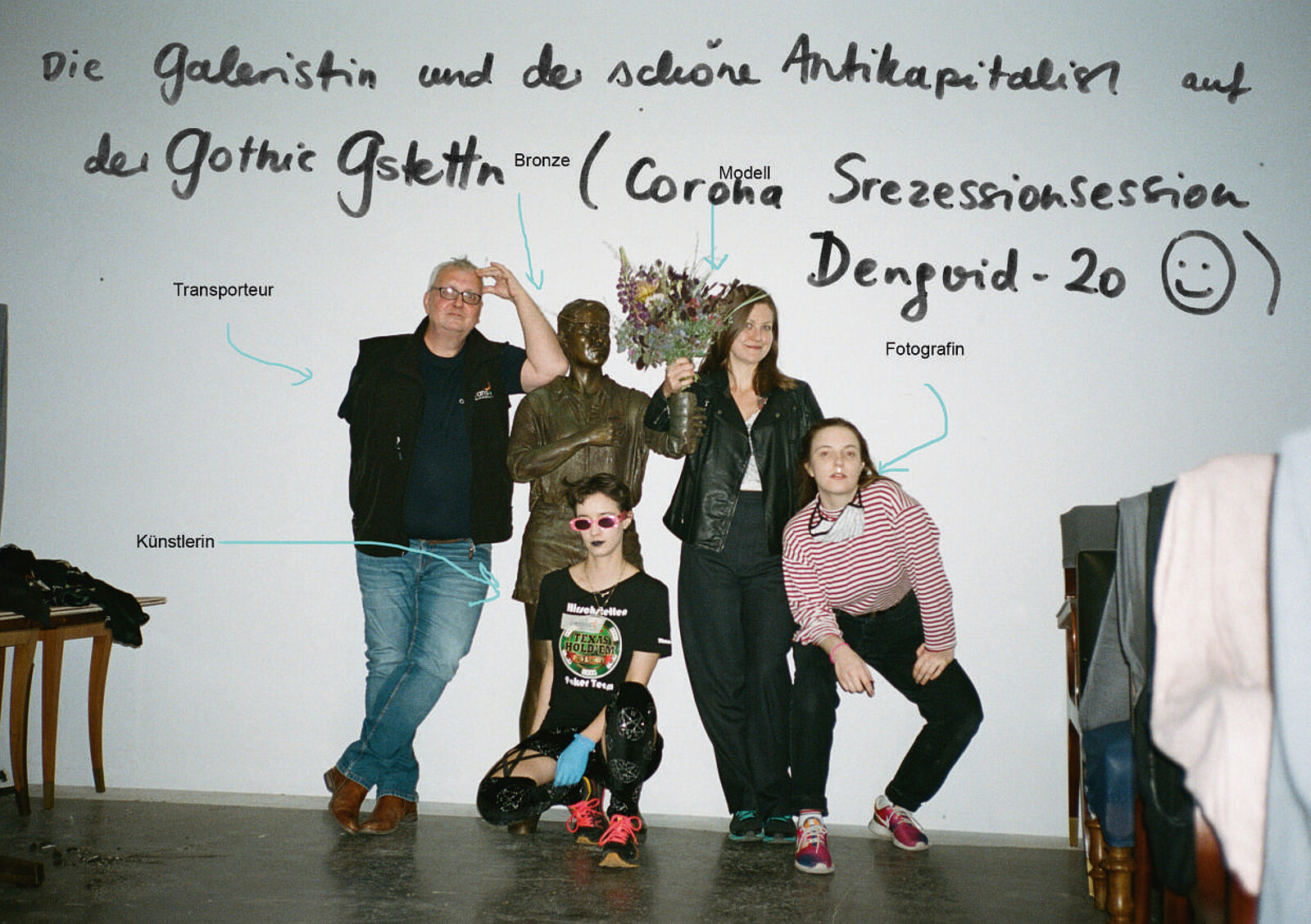Die Galeristin und der schöne Antikapitalist auf der Gothic G’stettn (Corona Srezessionsession Dengvid-20 :) )
July 3–September 6, 2020
July 3–November 8, 2020
Friedrichstraße 12
1010 Vienna
Austria
Hours: Tuesday–Sunday 10am–6pm
T +43 1 587530710
F +43 1 587530734
presse@secession.at
Verena Dengler
Verena Dengler makes art that is richly allusive, trenchant, and occasionally provocative. Astute observations of the art world with its mechanisms and historically contingent conditions as well as the artist’s own entanglements in it are often the subject of installations, objects, pictures, drawings, texts, videos (and a whole lot more) that offer reflections in which critique is leavened by humor and satire.
In the Secession’s gallery, the artist builds a “landscape” consisting of a pond—inspired by the Hirschstetten swimming hole on the outskirts of Vienna—and a surrounding overgrown urban wasteland or “Gstettn.” An emblem of an anarchic counterculture, the ensemble serves as the setting for other works and elements including a life-size bronze figure, a grand piano, and a mockup of an art-fair booth.
The early days of the Secession with its lavishly flower-bedecked sales exhibitions was one point of reference as the artist drew up the plans for her show, developed in dialogue with the historian of religion Barbara Urbanic; so was her engagement with the “omnipresent Romantic legacy” (Urbanic). Characteristics attributed to Romanticism such as the emphasis on individuality and feeling and the quest for the sublime, but also its “dark flipside” of melancholy, social critique, and cultural pessimism: these form a—sometimes latent, sometimes manifest—ferment that is at work to this day in subcultural youth movements and countercultures, contemporary popular as well as classical music, and many other domains.
The aftereffects of Romanticism also inform social and political realities, including the leeway for individual configurations of life and work framed by social networks, the development of flexible labor relations—something that artists are only too familiar with—and the associated phenomena of relentless self-improvement. The works in the exhibition reflect the interplay between past and present, between hegemonic and repressed as well as subversive forces that undermine the powers that be. Expanding on the presentation, an artist’s publication in magazine format will contain contributions by Barbara Urbanic, Diedrich Diederichsen, Anna Gien, and Leon Kahane and extensive series of photographs.
Verena Dengler, born in Vienna in 1981, lives and works in Vienna.
Suellen Rocca
With Suellen Rocca’s installation in the Grafisches Kabinett, the Secession is pleased and grateful to be able to present the last exhibition the artist conceived herself and to realize her ideas posthumously. She desired to show a series of new paintings and drawings together with three paintings from recent years—Departure (2012), At Sunset (2013) and Night (2014)—in a setting that includes a folding-screen and a simple bed. Alongside of the show, Rocca also drafted a publication with additional drawings and sketches, published by Secession according to the artist’s idea as a fan-folded book.
Suellen Rocca enjoyed a long and distinguished artistic career, which began in the 1960s as a member of the Chicago-based group Hairy Who, also known as Chicago Imagists. Her oeuvre is characterized by a distinct personal iconography, which she continuously expanded in tune with and reflecting transitions in her private life. This pictorial grammar is apparent in her figurative drawings and paintings and draws on repetition, the use of a grid, text and icons. It is informed and inspired by a broad range of visual culture, from Egyptian hieroglyphs to Surrealism to comics.
In the last decade, especially, Rocca turned to a more inward view. In this period of introspection the artist showed a great interest in the unconscious and included dream imagery in her work. Symbols like boats, ropes, ladders, fish, or clouds recurrently appear in her work and represent different states of being, while icons of generic furniture—bed, table, chair—address domestic life, the inward home.
Suellen Rocca was born in Chicago in 1943 and died in March 2020. Besides her artistic practice, she was director of exhibitions and curator of the Elmhurst College Art Collection in Elmhurst, Illinois.
Artist’s books are published in conjunction with both exhibitions.
The exhibition program is conceived by the board of the Secession.



